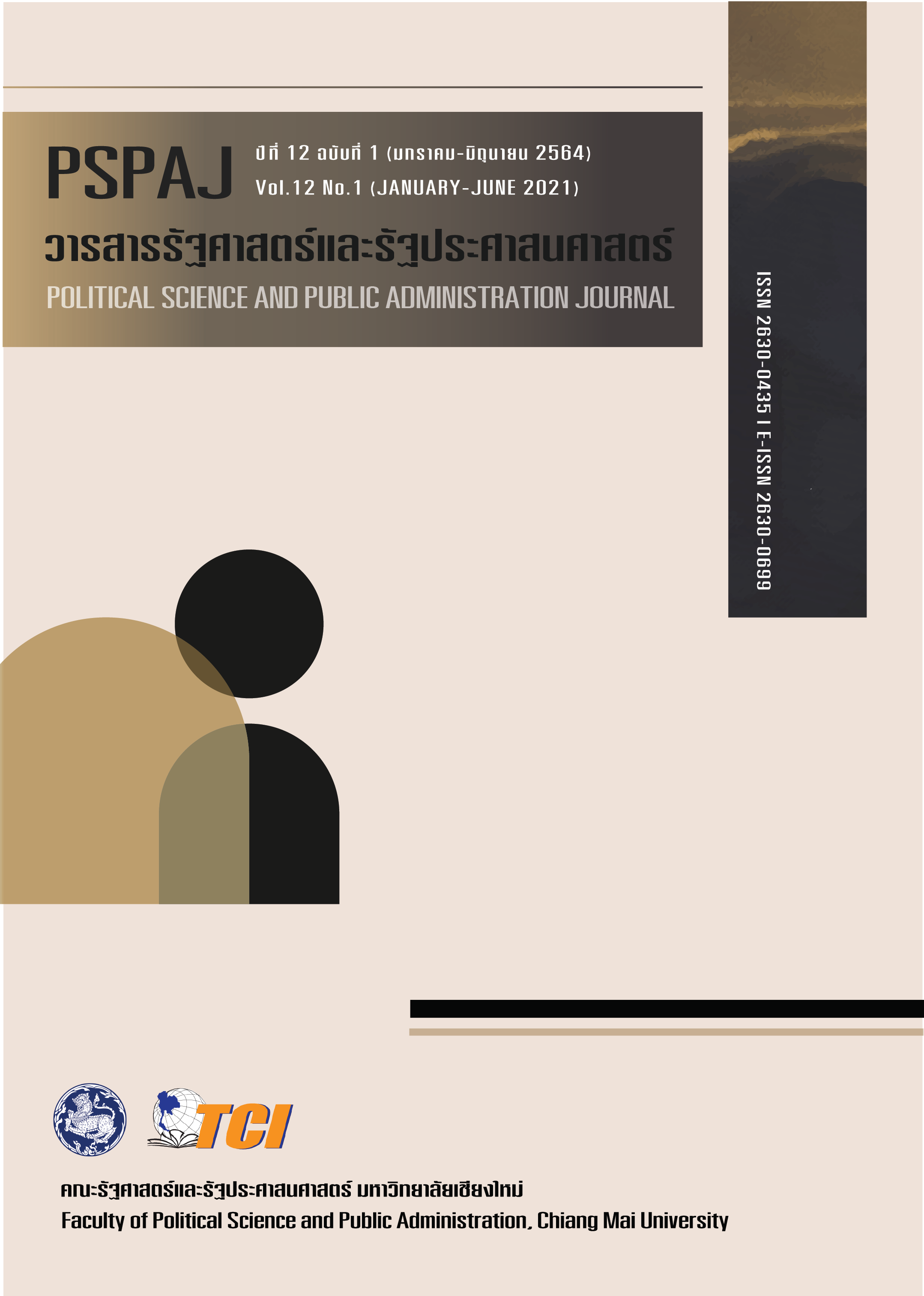Women’s Lived Experiences, Gender and Sexualities: An Analysis of Case Studies of Thai “Teenage Mothers” and Lao Women Working at a Karaoke Restaurant in Thailand
Main Article Content
Abstract
This paper presents a critical analysis of the lived experiences of women, whose gender and sexualities are formed through non-marriage relationships, and accordingly are often stigmatized as “misconducts” and “social problems.” This paper synthesizes arguments and draws from data presented in two Masters theses: one on Thai adolescents’ pregnancies and another on Lao migrant women who work at karaoke bars in Thailand. This paper addresses three key issues. Firstly, it notes how economic, social, and cultural contexts constrain women’s gender and sexualities. Case studies illustrate how dominant sexual norms and patriarchal values have contributed to the social stigmatization of certain women’s sexual behaviors as “deviance” or “social problems.” Second, it looks at how women’s agency and survival strategies play a crucial role in negotiation with economic and socio-cultural constraints. Finally, although social networks play a significant part in providing women with various kinds of support, their supportive roles should not be overemphasized. These networks are not necessarily harmonious, and there can sometimes be tensions among actors.
Downloads
Article Details
- เนื้อหาและข้อมูลที่ลงตีพิมพ์ในวารสารรัฐศาสตร์และรัฐประศาสนศาสตร์ถือเป็นข้อคิดเห็นและความรับผิดชอบของผู้เขียนบทความโดยตรง ซึ่งกองบรรณาธิการวารสารรัฐศาสตร์และรัฐประศาสนศาสตร์ ไม่จำเป็นต้องเห็นด้วย หรือร่วมรับผิดชอบใดๆ
- บทความและข้อมูล ที่ได้รับการตีพิมพ์ในวารสารรัฐศาสตร์และรัฐประศาสนศาสตร์ ถือเป็นลิขสิทธิ์ของวารสาร หากบุคคลหรือหน่วยงานใดต้องการนำข้อมูลไปใช้ประโยชน์ในทางวิชาการ ขอให้อ้างอิงแหล่งที่มาด้วย
References
กฤตยา อาชวนิจกุล, และพริศรา แซ่ก้วย. (2551). ฤา ปฏิบัติการของสังคมไทยในกระแสจารีตเรื่องเพศจะอ่อนกำลังลง?. ใน ธวัชชัย พาชื่น, และพิมพวัลย์ บุญมงคล (บก.). เพศวิถีศึกษาในสังคมไทย วิพากษ์องค์ความรู้และธรรมเนียมปฏิบัติเรื่องเพศวิถีในสังคมไทย (น. 57-72). กรุงเทพฯ: โรงพิมพ์เจริญดีการพิมพ์.
กฤตยา อาชวนิจกุล. (2554). เพศวิถีที่กำลังเปลี่ยนแปลงไปในสังคมไทย. ใน สุรีย์พร พันพึ่ง, และมาลี สันภูวรรณ์ (บก.). จุดเปลี่ยนประชากร จุดเปลี่ยนสังคมไทย (น. 44-66). นครปฐม: ประชากรและสังคม.
จามะรี เชียงทอง, และสุนทร สุขสราญจิต. (2555). มิแช็ล ฟูโกต์. กรุงเทพฯ: ศูนย์มานุษยวิทยาสิรินธร (องค์กรมหาชน).
ชลิดาภรณ์ ส่งสัมพันธ์. (2551). ประวัติศาสตร์เพศวิถี: ประวัติศาสตร์เรื่องเพศ/เรื่องเพศในประวัติศาสตร์ไทย. กรุงเทพฯ: มูลนิธิสร้างความเข้าใจเรื่องสุขภาพผู้หญิง.
ดวงหทัย บูรณเจริญกิจ. (2560). แนวคิดสตรีนิยมและขบวนการทางสังคมของผู้หญิงในประเทศไทย: วิเคราะห์ผู้มีส่วนเกี่ยวข้อง ข้อถกเถียงและยุทธศาสตร์. กรุงเทพฯ: มูลนิธิฟรีดริช เอแบร์ท.
นฤพนธ์ ด้วงวิเศษ. (ม.ป.ป.). ทบทวนวิธีการสร้างความรู้/ความจริงเรื่องเพศ. สืบค้นเมื่อ 20 มีนาคม 2563, จาก www.sac.or.th/databases/anthropology-oncepts/articles/2
นิภา จิรภัทร์. (2540). การควบคุมเรื่องเพศในผู้หญิงไทยปัจจุบัน: กรณีศึกษาการควบคุมเรื่องเพศในวัยรุ่น. (วิทยานิพนธ์สังคมวิทยาและมานุษยวิทยามหาบัณฑิต), สาขามานุษยวิทยา มหาวิทยาลัยธรรมศาสตร์.
วรรณพร ปันทะเลิศ. (2556). ผู้หญิงลาวที่ทำงานร้านคาราโอเกะในประเทศไทย: การย้ายถิ่นและการใช้ชีวิตข้ามพรมแดน. วิทยานิพนธ์สังคมวิทยาและมานุษยวิทยามหาบัณฑิต), สาขาวิชาสังคมวิทยา มหาวิทยาลัยธรรมศาสตร์.
วราภรณ์ แช่มสนิท. (2551). ภูมิทัศน์ของเพศวิถีศึกษาในฐานะกระบวนการต่อสู้ทางความรู้. ใน ธวัชชัย พาชื่น, และพิมพ์วัลย์ บุญมงคล (บก.). เพศวิถีศึกษาในสังคมไทย วิพากษ์องค์ความรู้และธรรมเนียมปฏิบัติเรื่องเพศวิถีศึกษาในสังคมไทย (น. 13-27). กรุงเทพฯ: เจริญดีการพิมพ์.
วาทินีย์ วิชัยยา. (2556). “แม่วัยรุ่น”: ประสบการณ์ชีวิต เพศภาวะ และเพศวิถี. (วิทยานิพนธ์สังคมวิทยาและมานุษยวิทยามหาบัณฑิต), สาขาวิชาสังคมวิทยา มหาวิทยาลัยธรรมศาสตร์.
วารุณี ภูริสินสิทธิ์ (2545). สตรีนิยม: ขบวนการและแนวคิดทางสังคมแห่งศตวรรษที่ 20. กรุงเทพฯ: โครงการจัดพิมพ์คบไฟ.
สุกฤตยา จักรปิง. (2558). วิกฤติการณ์ข้าวแห่งเอเชีย ค.ศ. 2008: ผู้หญิงความมั่นคงทางอาหารและการพัฒนา. สำนักบัณฑิตอาสาสมัคร, 11(2), 93-130.
สุชาดา ทวีสิทธิ์. (2550). ผู้หญิง ผู้ชาย และเพศวิถี: เพศภาวะศึกษาในงานมานุษยวิทยา. สังคมศาสตร์, 19(1), 311-357.
Agustin, L. M. (2006). The Conundrum of Women’s Agency: Migration and the Sex Industry. In O’ Neill, M., & Campbell, R. (Eds). Sex Work Now (pp.116-140). Cullompton: Willan Publishing.
Archbold, C. (2012). Research on Women in Policing: A Look at the Past, Present and Future. Sociology Compass, 6(9), 694–706.
Attwood, F., Jamie H., & Alison W. (2017). Mediated Intimacies: Bodies, Technologies and Relationships. Journal of Gender Studies, 26(3), 249-253.
Banks, O. (1999). Some Reflections on Gender, Sociology and Women’s History. Women’s History Review, 8(3), 401-410.
Basargekar, P. (2010). Measuring Effectiveness of Social Capital in Microfinance: A Case Study of Urban Microfinance Programme in India. International Journal of Social Inquiry, 3(2), 25-43.
Boris, E., & Parrenas, R. S. (2010). Introduction. In Boris, E. & Parrenas, R. S. (Eds). Intimate Labors: Culture, Technologies and the Politics of Care (pp. 1-12). California: Stanford University Press.
Broadbridge, A. (2010). Social Capital, Gender and Careers: Evidence from Retail Senior Managers. Equality, Diversity and Inclusion: An International Journal, 29(8), 815-834.
Curra, S. R., Garip, F., Chun, C. Y., & Tangchonlatip, K. (2005). Gendered Migrant Social Capital: Evidence from Thailand. Social Forces, 84(1), 225-255.
Garton, S. (2004). Histories of Sexuality. New York: Routledge.
Honkatukia, P., & Keskinen, S. (2018). The Social Control of Young Women’s Clothing and Bodies: A Perspective of Differences on Racialization and Sexualization. Ethnicities, 18(1), 142-161.
Katz, N., Lazer, D., Arrow, H., & Contractor, N. (2004). Network Theory and Small Groups. Small Group Research, 35(3), 307-332.
Komarovsk, M. (1991). Some Reflections on the Feminist Scholarship in Sociology. Annual Review of Sociology, 17(1), 1-25.
Kovacheva, S. (2004). The Role of Family Social Capital in Young People’s Transition from School to Work in Bulgaria. Sociologija, 46(3), 211-226.
Maclean, K. (2010). Capitalizing on Women’s Social Capital? Women-Targeted Microfinance in Bolivia. Development and Change, 41(3), 495-515.
Maguire, D. (2016). The Influence of Online Social Capital on Women's Career Change Advancing. Advancing Women in Leadership, 36, 64-72.
Miriam, K. (2005). Stopping the Traffic in Women: Power, Agency and Abolition in Feminist Debates over Sex-trafficking. Journal of Social Philosophy, 36(1), 1-17.
Nader, L. (1986). The Subordination of Women in Comparative Perspective. Urban Anthropology and Studies of Cultural Systems and World Economic Development, 15(3), 377-397.
Ngum Chi Watts, M. C., Liamputtong, P., & Mcmichael, C. (2015). Early Motherhood: A Qualitative Study Exploring the Experiences of African Australian Teenage Mothers in Greater Melbourne, Australia. BMC Public Health, 15(1), 1-11. Retrieved August 10, 2019, from DOI 10.1186/s12889-015-2215-2.
O’ Connell Davison, J. (2010). New Slavery, Old Binaries: Human Trafficking and the Borders of ‘Freedom’. Global Networks, 10(2), 244-261.
Oakley, A. (1972). Sex, Gender and Society. London: Temple Smith.
Parker, R. (2009). Sexuality, Culture and Society: Shifting Paradigms in Sexuality Research. Culture, Health & Sexuality, 11(3), 251–266.
Pham, T., & Talavera, O. (2017). Discrimination, Social Capital, and Financial Constraints: The Case of Viet Nam (WIDER Working Paper, No. 2017/67). Helsinki: United Nations University (UNU), World Institute for Development Economics Research (WIDER).
Prandini, R. (2014). Family Relations as Social Capital. Journal of Comparative Family Studies, 45(2), 221-234.
Reinharz, S. (1992). Feminist Methods in Social Research. Oxford: Oxford University Press.
Sullivan, B. (2003). Trafficking in Women. International Feminist Journal of Politics, 5(1), 67-91.
Weeks, J. (1981). Sex, Politics and Society. London: Longman.
Yeates, N. (2005). Global Migration Perspective. Retrieved on August 10, 2019, from https://www.refworld.org/pdfid/435f85a84.pdf
Yeoh, B. S.A., Chee, H. L., & Vu, T. K. D. (2014). Global Householding and the Negotiation of Intimate Labour in Commercially-matched International Marriage between Vietnamese Women and Singaporean Men. Geoforum, 51, 284-293.
Young, S. (2011). Gender, Policing and Social Control: Examining Police Officers’ Perceptions of and Responses to Young Women Depicted as Violent. (Doctoral dissertation), University of Stirling.


